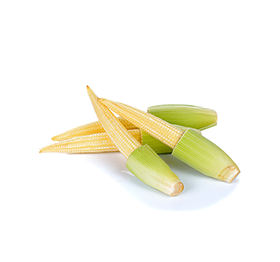Babycorn (बेबी कॉर्न)
Zea mays

About Babycorn
Babycorn
Babycorn is a cereal grain, picked (harvested) early from corn while these are small and immature. Babycorn is eaten raw and cooked, including cob. Babycorn is used in many dishes specially in stir fry dishes, it is considered to be one of the healthiest veggies. Babycorn are rich source of Vitamin A, Vitamin B, Vitamins E along with various other minerals. Babycorn is preferred food ingredient for the people who are on the diet plans for losing weight; as Babycorn is low in starch content. Generally Babycorn is prepared (cooked) as whole, it can be steamed or sautéed. Can be used fresh in salads.
Some of the qualities / health benefits of baby corn
- It helps in stimulating digestion, as these (baby corn ) are rich in both insoluble and insoluble fibre
- Low carb veggie
- Babycorn are good source of Folate (Folate is helpful to prevent neural tube defects.)
n the vibrant tapestry of Indian cuisine, baby corn emerges as a delightful gem, embodying both taste and nutrition. Its tender, crisp texture and subtly sweet flavor elevate dishes, creating a harmonious balance that tantalizes the palate. Whether nestled in a spicy stir-fry, adorning a colorful salad, or simmered in a rich curry, baby corn adds a refreshing crunch that enlivens every meal.
Rich in essential nutrients, including vitamins A and C, baby corn not only enhances the aesthetic appeal of your plate but also nourishes your body. Its high fiber content promotes digestive health, making it a wholesome choice for health-conscious individuals. Moreover, its versatility allows it to pair beautifully with a myriad of Indian spices, enriching traditional recipes while introducing a modern twist.
Imagine a plate adorned with vibrant hues—golden baby corn intertwined with the deep greens of spinach and the fiery reds of bell peppers, all dancing in a symphony of flavors. This enchanting vegetable not only captivates the eyes but also fills the heart with warmth and satisfaction.
To include Baby Corn in your daily menu, log on to planmeal, where you can discover recipes that celebrate this wonderful ingredient. Embrace the joy of cooking with baby corn and explore endless culinary possibilities. So, relish the crunch of baby corn, and let your meals flourish with flavor and health!
Baby corn: A delightful crunch for your plate!
In Indian Ayurveda, baby corn is valued for its nutritional properties and its ability to balance the body's doshas. It is considered beneficial for digestive health due to its high fiber content, which aids in proper digestion and alleviates constipation. Additionally, baby corn is rich in vitamins and minerals, contributing to overall vitality and energy.
In home remedies, baby corn can be used to prepare soups and salads that promote hydration and nourishment. Its mild flavor makes it an ideal ingredient in dishes designed to soothe the digestive system. Overall, incorporating baby corn into the diet aligns with Ayurvedic principles of promoting health and well-being through balanced nutrition.
How to Store Babycorn
To store baby corn, first wash it thoroughly under running water to remove any dirt. Next, gently pat it dry with a clean cloth or paper towel. Place the baby corn in a perforated plastic bag to allow for air circulation and prevent moisture buildup. Store it in the vegetable crisper drawer of your refrigerator to maintain freshness. If you plan to keep it for a longer period, blanch the baby corn in boiling water for a couple of minutes, then cool it quickly in ice water. Drain, pack in airtight containers, and freeze for up to 12 months.
Shelf Life of Babycorn
Fresh baby corn has a shelf life of about 5 to 7 days when stored in the refrigerator. For longer storage, it can be blanched and frozen, extending its shelf life to 8 to 12 months.
How to Check Babycorn Before Buying
When checking baby corn before purchasing, look for firm, bright yellow cobs with a smooth texture. The kernels should be small and tightly packed, indicating freshness. Avoid any with dark spots, wrinkles, or signs of mold, as these are indicators of age or spoilage. Gently squeeze the cobs; they should feel crisp and resilient. Additionally, check for a fresh, grassy smell, which is a sign of quality.
While it's possible to buy baby corn in bulk, it's advisable to consider your immediate usage. If you plan to consume it within a week, buying in larger quantities is fine. However, for longer storage, consider purchasing smaller amounts to maintain freshness, as baby corn has a limited shelf life of about 5 to 7 days when refrigerated. Always ensure proper storage to maximize its longevity and flavor.
Explore
Explore our services and take your business to the next level.
Recent Posts

Shakkarpare is the perfect sweet treat to complement your balanced weekly menu....

Hara Bhara Kabab is the perfect addition to a balanced weekly menu, offering a d...

Savor the warmth of Palak Dal Khichdi, a nourishing and comforting dish that bea...

Paneer Missi Roti is a nutritious and delicious addition to your weekly meal pla...

Barley Chilla is a wholesome, nutrient-packed dish that can easily be incorporat...
Ready for a Healthier You?
Take control of your wellness! Get a customized meal plan that fits your lifestyle. It's time to eat smarter, feel better, and transform your life!
Get Your Plan Now!Already a member? Login and start now!
Nutrition Facts
Serving Size:
Servings Per Container: 1
| Amount Per Serving | ||
|---|---|---|
| Calories | 73.16 | |
| Fat | ||
| Saturated Fat | ||
| Trans Fat | ||
| Cholesterol | 0 | |
| Sodium | 1.4 | |
| Carbs | 11.66 | |
| Fiber | ||
| Sugar | 1.5 | |
| Protein | 1.5 | |
| VitaminD | ||
| Calcium | 76.51 | |
| Iron | 1.45 | |
| Potassium | 260 | |
* Percent Daily Values are based on a 2000 calorie diet.
* Percent Daily Values are based on a 2000 calorie diet.




